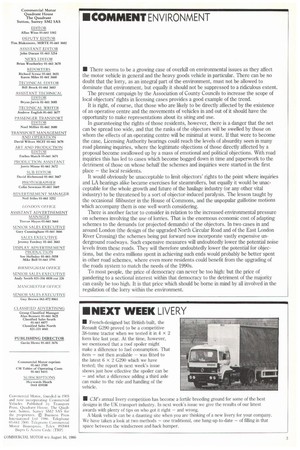MOMENT ENVIRONMENT
Page 5

If you've noticed an error in this article please click here to report it so we can fix it.
• There seems to be a growing case of overkill on environmental issues as they affect the motor vehicle in general and the heavy goods vehicle in particular. There can be no doubt that the lorry, as an integral part of the environment, must not be allowed to dominate that environment, but equally it should not be suppressed to a ridiculous extent.
The present campaign by the Association of County Councils to increase the scope of local objectors' rights in licensing cases provides a good example of the trend.
It is right, of course, that those who are likely to be directly affected by the existence of an operative centre and the movements of vehicles in and out of it should have the opportunity to make representations about its siting and use.
In guaranteeing the rights of those residents, however, there is a danger that the net can be spread too wide, and that the ranks of the objectors will be swelled by those on whom the effects of an operating centre will be minimal at worst. If that were to become the case, Licensing Authority hearings could reach the levels of absurdity seen in many road planning inquiries, where the legitimate objections of those directly affected by a proposal become swallowed up by a mass of emotional and political objections. With road inquiries this has led to cases which become bogged down in time and paperwork to the detriment of those on whose behalf the schemes and inquiries were started in the first place — the local residents.
It would obviously be unacceptable to limit objectors' rights to the point where inquiries and LA hearings alike became exercises for steamrollers, but equally it would be unacceptable for the whole growth and future of the haulage industry (or any other vital industry) to be threatened by a sort of objector-induced paralysis. The lesson taught by the occasional filibuster in the House of Commons, and the unpopular guillotine motions which accompany them is one well worth considering.
There is another factor to consider in relation to the increased environmental pressure on schemes involving the use of lorries. That is the enormous economic cost of adapting schemes to the demands (or projected demands) of the objectors. In two cases in and around London (the design of the upgraded North Circular Road and of the East London River Crossing) the schemes being put forward now incorporate vastly expensive underground roadways. Such expensive measures will undoubtedly lower the potential noise levels from these roads. They will therefore undoubtedly lower the potential for objections, but the extra millions spent in achieving such ends would probably be better spent in other road schemes, where even more residents could benefit from the upgrading of the roads system to match the needs of the 1990s.
To most people, the price of democracy can never be too high: but the price of pandering to a sectional interest within that democracy to the detriment of the majority can easily be too high. It is that price which should be borne in mind by all involved in the regulation of the lorry within the environment.




































































